5 famous learning lands of Nghe An
(Baonghean.vn) -Nghe An is a land of talented people, literature and mandarin exams. From the tradition of learning, it has produced many famous "talents".
Thanh Chuong - many families are famous for their learning
In the feudal examination system of Vietnam, Nghe An had 150 people who passed the imperial examinations, of which Thanh Chuong district alone had 25. Of these, 3 people passed the doctoral examinations: Nguyen Tien Tai (passed the examination in 1664), Pham Kinh Vy (1724) and Nguyen Lam Thai (1739).
Notably, during the Le Trung Hung period (1533 - 1789), there were two father and son, Nguyen Phung Thoi and Nguyen Ba Quynh, in Hoa Lam commune, Xuan Lam canton, Nam Duong district (now Ngoc Son commune, Thanh Chuong district), who both passed the imperial examinations.
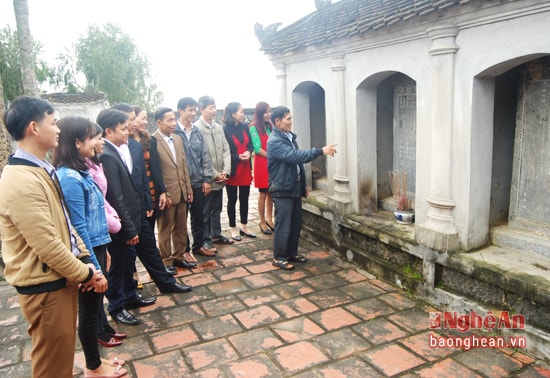 |
| Vo Liet Communal House (Vo Liet Commune, Thanh Chuong) has become a red address to educate generations on the tradition of studiousness and patriotism. Photo courtesy |
That difficult land was the birthplace and residence of famous families, many of whom studied hard and became talented, leaving a good name for their homeland and country such as the Nguyen Tai family in Thuong Tho (Thanh Van), the Tran Sy family in Phuong (Thanh Giang), the Nguyen Sy and Nguyen Duy families in Ke Tram (Thanh Luong), the Ton family in Vo Liet...
Vo Liet Communal House (Vo Liet Commune, Thanh Chuong) - the place to worship Thanh Hoang Phan Da, a general of Le Loi, has 2 rows of stele houses with 6 stone steles recording the names and hometowns of 455 scholars, from bachelors, bachelors to doctors of General Vo Liet from the Later Le Dynasty to the Nguyen Dynasty... Vo Liet Communal House is considered the "Temple of Literature" of Thanh Chuong District.
In Thanh Huong commune, there is a mountain shaped like a pen writing on a page of a book that is the sky. People call it Pen Tower Mountain to express their desire for success in the path of examinations, wishing their children to be successful in their studies, leaving a good name for posterity.
Yen Thanh - the top scholar in a prefecture
Farmers in Yen Thanh district not only domesticated and preserved precious rice varieties such as "Dam" rice and "Dau" rice, but also loved learning, upholding the tradition of hard work, studiousness and good learning.
During the time when Confucianism was still flourishing, every village reserved a portion of its land for education. Many villages built temples of literature and established literary associations and school associations to honor Confucianism. Whether rich or poor, every family tried to educate their children to “learn a few words to become a good person.”
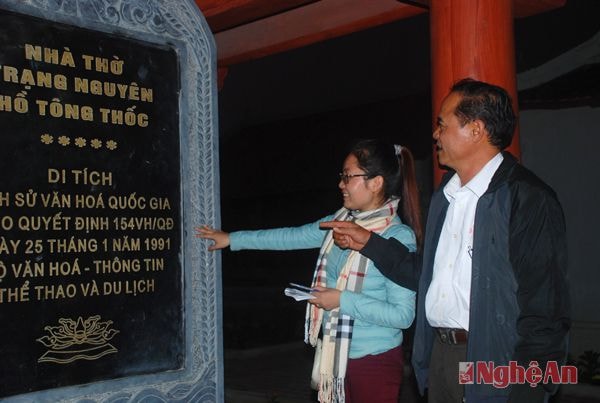 |
| Stele of the National Historical - Cultural Relics Complex of Temple of the First Doctor Ho Tong Thoc. Photo courtesy |
The person who started the tradition of mandarin examinations in Yen Thanh district and the whole Nghe An province was the first-ranked mandarin Bach Lieu. He was originally from Truc Ha village, Thanh Da commune (now Ma Thanh commune). Bach Lieu passed the mandarin examination in the Binh Dan year, the ninth year of Thieu Long (1266) under the reign of King Tran Thanh Tong.
From then on, according to the documents of the imperial examinations, Yen Thanh district had 22 people who passed the imperial examinations, including 4 first-class laureates (Nghe An had 6 first-class laureates), 3 third-class laureates, 3 second-class laureates, 7 doctors, and 4 vice-bachelors. Quy Trach district had 4 first-class laureates, 2 second-class laureates, 4 doctors, 20 bachelors, and 192 bachelors. Tam Tho village (now Tho Thanh commune) had 3 first-class laureates, 1 doctor, 1 bachelor, dozens of students, and bachelors. In Trang Thanh, there were 2 third-class laureates, 1 third-class laureate (doctor), 21 bachelors, and 81 bachelors...
The tradition of studiousness, hard work and good study of the people of Yen Thanh district has been nurtured and promoted throughout history, continuing until the period of modern learning, learning the national language and French, which has produced a new generation of intellectuals, promptly absorbing the "New Books" of the patriots Phan Boi Chau, Phan Chu Trinh and the documents and books of Nguyen Ai Quoc sent from abroad, which have become red seeds, contributing to spreading the "Revolutionary Path" to the patriotic movement of the people of Yen Thanh district in the years 1925 - 1930.
One of the first seed sowers was Phan Dang Luu - a famous revolutionary activist of the Communist Party of Vietnam.
As a child, Phan Dang Luu was known to be a good student and intelligent. At the age of 16, he took the Huong exam, although he had to declare his age two years older to be able to take the exam (1918). However, because Confucianism was no longer respected, he studied Quoc Ngu and French at the Franco-Vietnamese Primary School in Vinh and the Quoc Hoc School in Hue. Phan Dang Luu's influence on the revolutionary movement in his homeland was enormous.
Do Luong - Land of valedictorians
The names of places and villages such as Bach Ngoc, Van Khue, Van Lam, Van Trang, Ru But, Hon Nghien, Hon Muc... have long been symbolized by the people to express their aspiration to excel in the path of learning and passing exams. The philosophy of "learning to know, knowing to be a human being" has been refined and distilled through many generations, becoming the tradition of studiousness and respect for talent of the people of Do Luong today.
The book "Nghe An Royal Examinations" (1075 - 1919) mentioned a story about a man in Nhan Hau village, Nam Son commune, Do Luong district. He was Nguyen Dang Quy, also known as Phuc Trach, born in the 26th year of Chinh Hoa (1705), the son of a famous scholar named Nguyen Dang Cu who was famous for his knowledge in the Confucianism village at that time. At the age of 25, Nguyen Dang Quy passed the Huong Cong examination and passed the Hoi examination in 5 consecutive exams. At the age of 40, he took the Hoi examination and passed the Tam Truong exam (like the Pho Bang exam of the Nguyen dynasty) and the Ngu - An exam with the exam questions set by the king (like the doctoral exam).
Do Luong did not have many people who were good at studying, passed high exams, had literary talent and were called "Tu Lan", "Tu Ho" like the descendants of Ho family or in Nam Dan at that time. But there were many people, many families, no matter how difficult, who sent their children to school with the simple but profound philosophy "study to know, know to be human".
Imbued with that philosophy, up to now, there are many people "originated" from Do Luong who have overcome difficulties to study, pass exams, and become known throughout the country. They are Professor, Doctor, Academician Nguyen Canh Toan, Art Researcher and Critic Thai Ba Van, Professor Hoang Huu Yen, Professor, Doctor Nguyen Sy Mao, Professor, Doctor Thai Ba Cau, Professor, Doctor Hoang Van Hoan, Associate Professor, Doctor Nguyen Ba Chat, Associate Professor, Doctor Nguyen Ba Minh, Associate Professor, Doctor Le Viet Nghi, Professor, Doctor, People's Artist Hoang Xuan Luong...
In recent years, Do Luong people have become more excited and proud when children in the district and commune study and achieve high results, causing some people to excitedly write "Do Luong - land of valedictorians!".
If before there was Truong Hong Quang - National Literature First Prize (1976), then later Nguyen Tat Nghia - International Physics and Asia - Pacific Gold Medalist (2009), then a series of students who passed the valedictorian exams of universities all had "origins" from Do Luong: Hoang Tuan Anh (2005), Tang Van Binh (2011), Nguyen Duy Hai (2012)...
Quynh Luu - Land of respect for words
Quynh Luu, the northernmost point of Nghe An, has a long tradition of learning, in which the village of Quynh Luu is the representative of learning. According to feng shui theory, Quynh Doi is a land of "spiritual people". To the southeast are two stone pillars rising like two pens and a rock pool resembling an inkstone called Hon But and Hon Nghien.
Is that why Quynh Doi people have a tradition of being studious, studying well, passing exams with high scores, and becoming high-ranking officials? During the feudal and colonial period, many poor families had to go crab hunting and snail catching but still tried to let their children pursue their studies. "Begging to learn a few words of the sages", Quynh Doi in the past only had two jobs: studying and weaving silk, and few did farming because of the small amount of land.
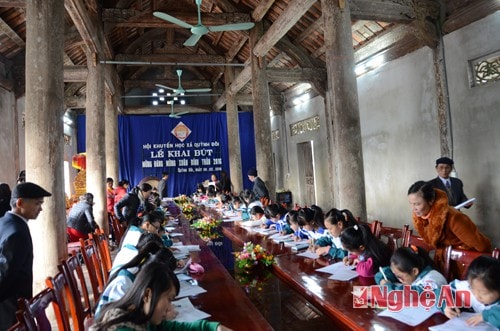 |
| Writing at the beginning of Spring is a beautiful cultural feature in the land of learning Nghe An in general and Quynh Doi commune (Quynh Luu district) in particular. Photo courtesy |
At that time, Quynh Doi had 531 students (Tu tai), 203 huong cong (Cu nhan) with 958 people passing 116 regional exams, of which 13 were first-class winners such as: Duong Cat Phu, Ho Si Duong, Nguyen Duong Duc, Phan Dinh Phat... those passing the grand exam had 4 vice-rank winners: Ho Ba On, Phan Duy Pho, Hoang Mau, Le Xuan Mai. There were 6 doctors: Ho Si Tan, Phan Huu Tinh, Ho Si Tuan, Van Duc Giai, Nguyen Si Pham, Duong Thuc Hap; 2 royal exams: Ho Phi Tich, Ho Si Dong; one third-class winner: Duong Cat Phu; one second-class winner: Ho Si Duong.
During the French colonial period, the first person to graduate as valedictorian of the Law University in Indochina was Nguyen Xuan Duong (later Chief Justice of the Northern Supreme Court and then Chief Justice of Hanoi). Also during this period, the only person in the country to receive Bao Dai's award in a special exam (Concours général) was Mr. Nguyen Dinh Luong.
After the August Revolution of 1945, Quynh Doi commune had famous doctors such as: Nguyen Xuan Dung, Phan Tam Dong, Phan Cu Tien, Ho Duc Viet...; Associate Professors: Van Nhu Cuong, Ho Si Giao, Hoang Van Lan, Duong Nhu Xuyen...; Professors: Phan Cu Nhan, Phan Cu De, Phan Cu Tien, 3 international academicians: Nguyen Xuan Dung, Phan Cu De, Phan Cu Tien.
Although Quynh Doi people were poor, they loved to study. Folklore still tells the story of Mr. Ho Si Duong. His family ate only vegetables and pickles for meals, and there were many days when they went without food, but he still had the will to study. He passed the Huong exam (1651) and the Dong Cac exam (1659), becoming one of two Vietnamese people who passed the national exam (the other was Mac Dinh Chi).
Dien Chau - the land of "father and son of the same class"
Studiousness, hard work, intelligence and cleverness are good qualities that have become traditions of Dien Chau people.
Under the Confucianism, Dien Chau had 34 people who passed the royal examinations and more than 400 people who passed the secondary examinations (huong cong - bachelor). Mr. Nguyen Xuan On, from Dien Thai, from a scholarly Confucian, became a mandarin, a poet, a patriot, and the leader of the Can Vuong uprising in Bac Nghe - Tinh; Mr. Cao Xuan Duc became the Minister of the Eastern Palace, University Scholar in the Nguyen Dynasty...
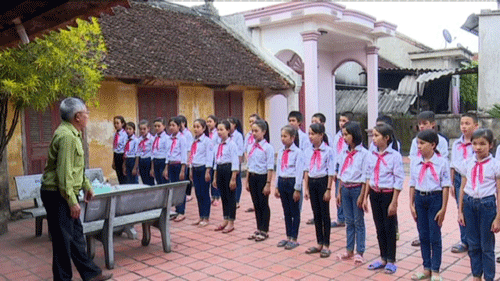 |
| Every year, schools coordinate with the family council to organize 50 hours of extracurricular activities for students at the church so that they can learn from the example of hard work of Mr. Nghe On. Photo courtesy |
In Nho Lam village, there was Mr. Dang Van Thuy, who came from a common family. His grandfather was a blacksmith and his father was a poor scholar. In the Giap Thin (1904) examination, he passed the royal examination and became the National University's Te Tuu. Before that, during the Le dynasty, Hoang Nhac passed the doctorate in 1502. During the French colonial period, Hoang Duc Thi passed the Indochina Pedagogical College and was a dedicated teacher...
Notably, in the whole country, only the Ngo - Ly Trai family in Dien Chau enjoyed the honor of "father and son in the same exam", meaning that both father and son passed the exam with high scores in the same exam (the exam of Nham Thin, Quang Hung 15th year, ie 1592). This event was recorded in the Vietnam Guinness Book of Records with the content "Honoring the record of father and son passing the doctoral exam for the first time in the same exam" for the father, the famous person Ngo Tri Tri, and the son, the famous person Ngo Tri Hoa.
Good wine needs no bush, the Ngo family has contributed to Vietnam for generations with many famous generals and meritorious people, including in modern times, names such as Major General Ngo Sy Quan, Lieutenant General Ngo Van Son, Major General Ngo Sy Hien, Mr. Ngo Quang Xuan - Chairman of the National Assembly's Foreign Affairs Committee...; and also the great-grandchild Ngo Phuong Lan, Miss World Vietnam 2007.
Pear Flower
(Synthetic)
| RELATED NEWS |
|---|

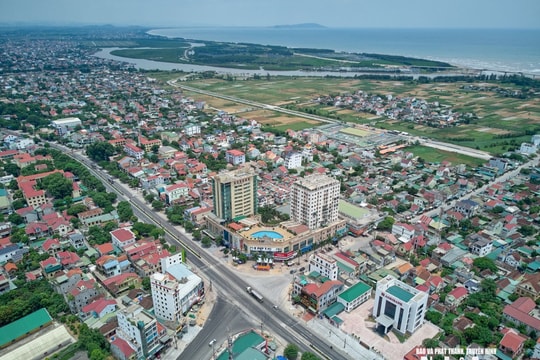
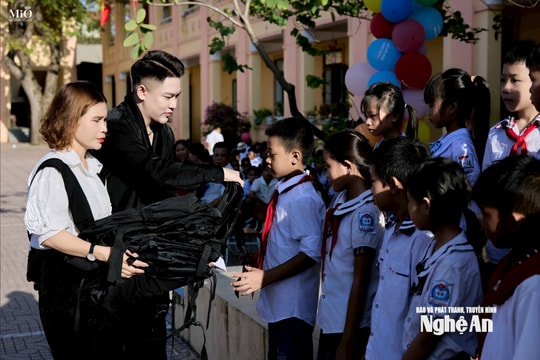
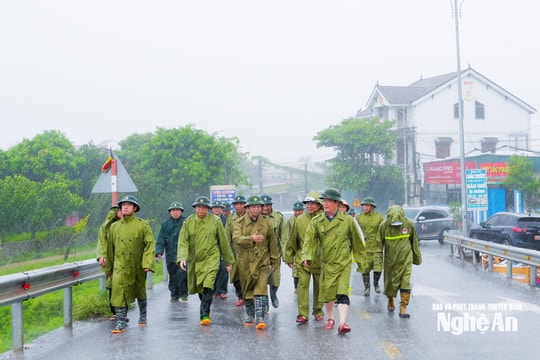
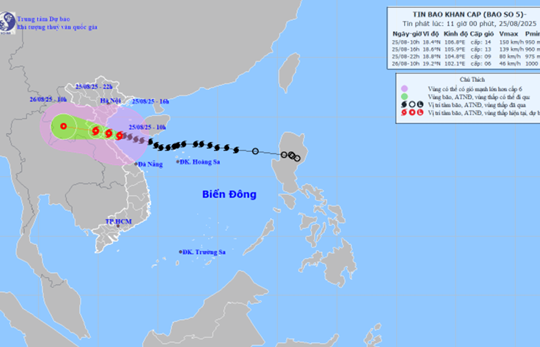
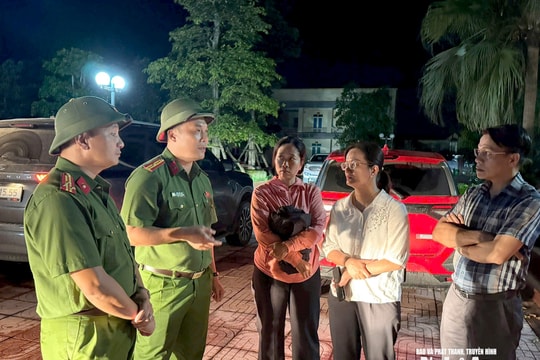
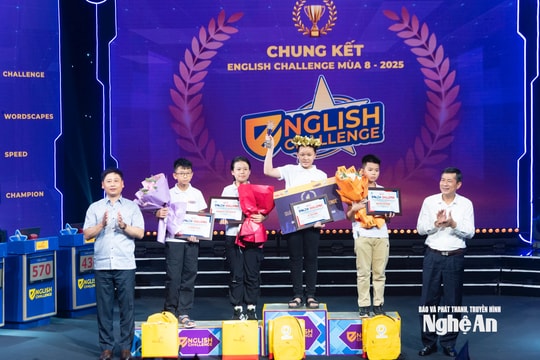
.jpeg)
